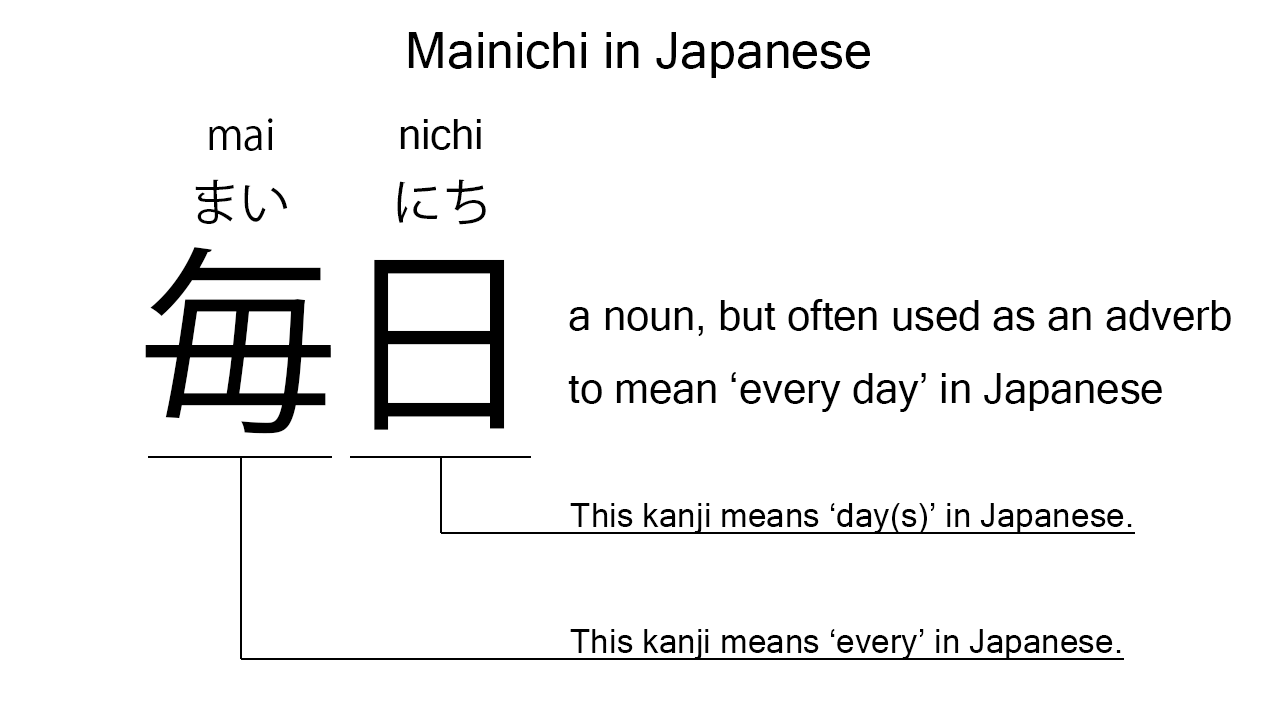What does “mainichi” mean in Japanese?
Native speakers use mainichi to mean ‘every day’ in Japanese. Perhaps, some Japanese learners know this word as it is sometimes used in Japanese conversations. In this blog post, however, I will explain this word in detail based on its kanji expression. And also, I will explain how to use it through example sentences. My explanations would help Japanese learners understand mainichi more clearly. Then, let’s get started!
Contents
Definition and meaning of “mainichi”
Let me start with the definition and meaning of mainichi.
- mainichi – 毎日 (まいにち) : a noun, but often used as an adverb to mean ‘every day’ in Japanese.
Grammatically, this is a noun. In Japanese, however, many time-related nouns can also work as adverbs. Mainichi is one of them. It can work as an adverb almost anywhere in a sentence to mean ‘every day’ in Japanese. Perhaps, this fact can be a bit wired to Japanese learners, but this is not unique to the Japanese language. For example, tomorrow in English can work as both a noun and an adverb. So, Japanese learners, especially those who are familiar with English, can easily understand this point, I think.
The definition and meaning are simple and clear. To understand this word more clearly, however, let me explain its kanji characters in detail, one by one.
Mainichi in kanji
The kanji expression of mainichi consists of the following two kanji characters:
- 毎 : a kanji character often used as a prefix or suffix to add the meaning of ‘every’.
- 日 : a kanji character used to mean a ‘day’, ‘sun’, or such in Japanese.
From these two kanji characters, we can understand that mainichi literally means ‘every day’ in Japanese. This literal interpretation is completely in line with the actual meaning.

When we meet new kanji expressions, we should check their kanji characters in detail to understand their meanings clearly and deeply. In many cases, kanji characters tell us a lot about the meanings of the expressions they form. Actually, here, we could get the better understanding of mainichi through the detailed kanji check above.
So far, I’ve explained the definition and meaning of mainichi together with its kanji characters. Then, let me explain how to use it through the example sentences below.
How to say “every day” in Japanese
watashi tachi wa mainichi hashiri masu – 私達は毎日走ります (わたしたちはまいにちはしります)
We run every day.
Below are the new words used in the example sentence.
- watashi – 私 (わたし) : a pronoun meaning ‘I’ in Japanese.
- tachi – 達 (たち) : a suffix used after a noun or pronoun to make its plural form. In the example, this is used after watashi to make its plural form, watashi tachi, which means ‘we’ in Japanese. Learn more about Japanese plural.
- wa – は : a binding particle working as a case marker or topic marker. In the example, this works after watashi tachi to make the subject in the sentence.
- hashiri – 走り (はしり) : one conjugation of the verb, hashiru, which means ‘to run’ in Japanese. In the example, it has been conjugated for the better connection with its following word.
- masu – ます : an auxiliary verb used after a verb to make it polite. Probably, this is well known as a part of Japanese masu form. In the example, this is used after hashiri to make it sound polite.
This is a typical usage of mainichi. In this example, it works in the middle of the sentence to mean ‘every day’ in Japanese.
Another example of “mainichi”
kanojo tachi wa mainichi koko de hataraku – 彼女達は毎日ここで働く (かのじょたちはまいにちここではたらく)
They work here every day.
Below are the new words used in the example sentence.
- kanojo – 彼女 (かのじょ) : a pronoun meaning ‘she’ in Japanese.
- koko – ここ : a pronoun used to refer to a place close to the speaker.
- de – で : a case particle used to say where someone does something. In the example, this is used after koko to say where they work every day.
- hataraku – 働く (はたらく) : a verb meaning ‘to work’ in Japanese.
This is another example of mainichi. When we want to mean ‘every day’ in Japanese, anyway, this word is always a very good option.
Summary
In this blog post, I’ve explained the definition and meaning of mainichi in detail based on its kanji expression. And also, I’ve explained how to use it through the example sentences. Let me summarize them as follows.
- mainichi – 毎日 (まいにち) : a noun, but often used as an adverb to mean ‘every day’ in Japanese. These two kanji characters literally mean ‘every day’ in Japanese. So, what the kanji characters express is completely in line with the actual meaning. When we want to mean ‘every day’ in Japanese, this word is always a very good option.
Hope my explanations are understandable and helpful for Japanese learners.
Leave a Reply